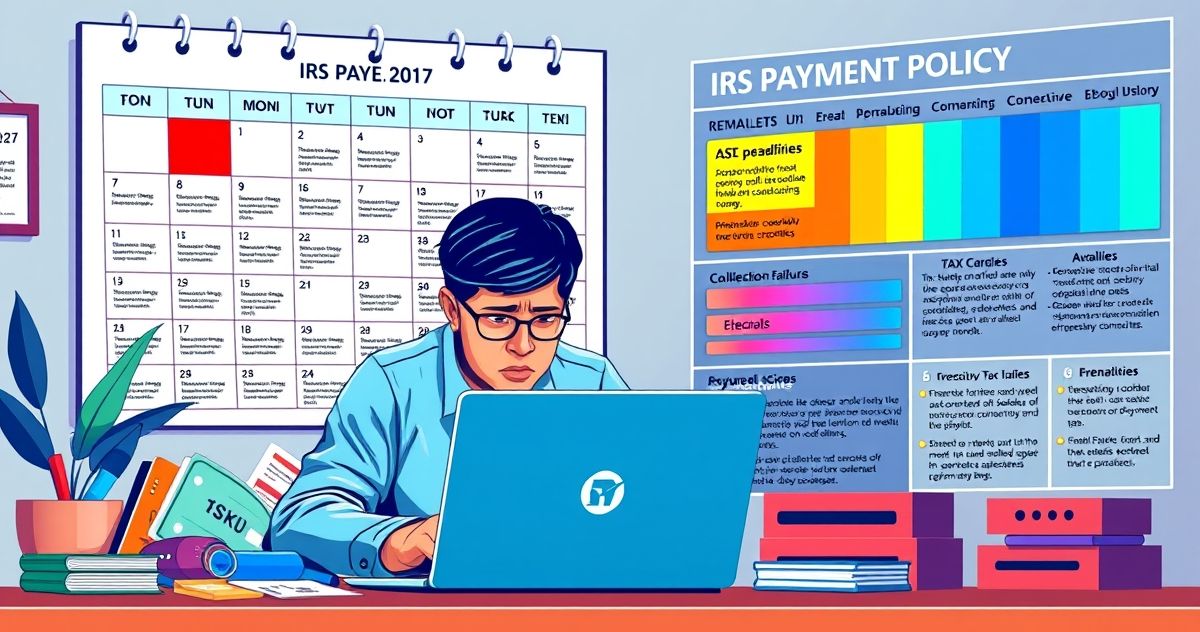IRS Payment Policy: An In-Depth Guide
The IRS Payment Policy is a set of guidelines and regulations established by the Internal Revenue Service (IRS) to assist taxpayers in understanding their financial obligations and the methods available for settling those obligations with the government. The primary purpose of this policy is to ensure that taxpayers are informed about how to remit payments accurately and timely, thereby maintaining compliance with IRS regulations and avoiding penalties. Tax compliance is not only crucial for individuals and businesses for financial reasons but also for the upkeep of national economic stability.
What is the IRS Payment Policy?
The IRS Payment Policy provides a comprehensive framework that details the various methods through which U.S. taxpayers can fulfill their tax obligations. This structured system is designed to cater to a wide array of taxpayers, ranging from individuals to large corporations, thereby enhancing accessibility and convenience. Recognizing the financial diversity of taxpayers, this policy emphasizes flexibility, ensuring that every taxpayer has a feasible method to comply with their fiscal responsibilities.
Key Features and Components
The IRS Payment Policy includes several critical components:
- Payment Methods: The policy offers multiple payment methods including electronic funds withdrawal, credit/debit card payments, checks, money orders, and cash payments made at specifically approved establishments. Electronic payments are particularly encouraged as they are secure, fast, and reduce processing times.
- Payment Plans: For taxpayers unable to pay their tax bill in full, the IRS offers installment agreements and payment plans, enabling them to pay off their tax debt over time. These agreements provide a viable path for taxpayers facing financial hardships to avoid penalties for late payments.
- Due Dates: The IRS Payment Policy specifies due dates for tax payments, which generally align with tax filing deadlines. Graduate of understanding these dates is critical for compliance, as late payments may lead to accruing interest and penalties.
- Penalties for Non-Compliance: Taxpayers who fail to comply with payment guidelines may face severe penalties. These can include late payment penalties, interest on unpaid taxes, and, in extreme cases, enforced collection actions like liens or levies.
Relevant Filing and Compliance Requirements
Compliance with the IRS Payment Policy entails meeting various filing requirements. Taxpayers must file their tax returns accurately and on time to determine the correct amount of taxes owed. Furthermore, any discrepancies or amendments need to be addressed expeditiously. Taxpayers should also consistently monitor communications from the IRS, such as notices about underpayments or adjustments needed, to adjust their payments accordingly.
Consequences of Non-Compliance
Failure to adhere to the IRS Payment Policy can result in significant consequences. These include:
- Financial Penalties and Interest: One of the immediate consequences of non-compliance is the imposition of penalties for late payments, which can quickly escalate the total balance owed.
- Enforced Collection Actions: The IRS has the authority to collect unpaid taxes via liens, levies, and garnishments if a taxpayer’s account remains unpaid. Such actions can significantly impact a taxpayer’s financial stability and credit rating.
- Impact on Future Compliance: Non-compliance can affect a taxpayer’s filial abilities to obtain installment agreements or other leniency from the IRS, making future tax obligations even more cumbersome.
Importance of the IRS Payment Policy
Understanding the IRS Payment Policy is essential for maintaining tax compliance and financial health. Its significance extends beyond mere tax form submission; it encompasses a taxpayer’s overall relationship with the IRS. By ensuring informed participation in this system, taxpayers can effectively manage their fiscal responsibilities, avoid unnecessary penalties, and foster a straightforward interaction with the IRS.
The IRS Payment Policy plays a pivotal role in achieving efficient resolution of tax debts. For those seeking resolution options like an Offer in Compromise, complying with payment regulations is a prerequisite. It streamlines the process for tax debt resolution, making it a cornerstone for financial compliance in the taxpayer’s lifecycle.
In conclusion, the IRS Payment Policy is more than a guideline; it is a comprehensive road map for taxpayers to navigate their financial obligations towards the government. By adhering to this policy, taxpayers can ensure that they efficiently meet their fiscal responsibilities, maintain good standing, and safeguard against the stresses of non-compliance.

